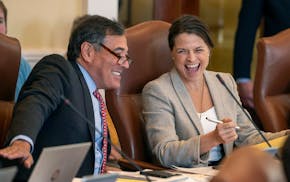To make the math work for his transit plans, Gov. Mark Dayton on Thursday proposed raising the metro transit sales tax by a half cent, double the increase he'd sought earlier.
The larger hike is intended to make up for a loss of metro transit funding that would have come with the broader state business taxes, which Dayton abandoned in the face of intense opposition.
Dayton's revamped budget includes a half-cent increase intended just for transit. That shows that he "continues to fund a metro area transit system expansion at nearly the same level as his original budget," said Meredith Salsbery, a spokeswoman for the Metropolitan Council, a regional agency that oversees transit in the Twin Cities.
Dayton earlier proposed raising the transit sales tax by only a quarter-cent. Combined with the broader business taxes he had proposed, it was expected to bring in about $250 million a year. Without them, the quarter-cent transit sales tax increase would have raised only $110 million. The Met Council says the proposed half-cent metro sales tax should bring in nearly the same amount.
Hennepin, Ramsey, Anoka, Washington and Dakota counties already levy a quarter-cent sales tax for transit development. Dayton's latest proposal would raise their transit tax to three-quarters of a cent and impose a half-cent transit tax for the first time on Carver and Scott counties.
Dayton spokeswoman Katharine Tinucci said the governor's proposal is intended "to provide a dedicated revenue stream to build a transit system that will serve the needs of working people and families for years to come."
The Met Council has been counting on a transit sales tax increase to help finance 20 rapid-bus lines as well as light-rail operations.
A half-cent increase also could allow the agency to accelerate development of light-rail construction, clearing the way for four or more lines to be completed earlier, said Sen. Scott Dibble, DFL-Minneapolis, chairman of the Senate Transportation Committee. Transit advocates have complained that lower funding has slowed the pace of transit construction and completing an interconnected system.
"We'll start looking at getting a substantial buildout by 2020 or shortly thereafter, versus waiting until 2030," Dibble said.
Rep. Mike Beard, R-Shakopee, said imposing a half-cent transit sales tax on Scott and Carver counties will require greater scrutiny of transportation issues. "We're going to have to get into the fracas here and make sure we defend ourselves and at least get some of that money back for our transit purposes," he said. "We need to make sure we get a fair shake."
Unlike the current transit tax, the additional transit tax would become effective without approval of metro area county boards if passed by the Legislature.
A half-cent increase in the metro transit tax would shift more of the cost of building the Southwest Corridor light rail from state to local government.
Pat Doyle • 612-673-4504
The Latest | Seated juror in hush money trial excused as prosecutors ask judge to sanction Trump

Biden scores endorsements from Kennedy family, looking to shore up support against Trump and RFK Jr.
Vice President Harris returning to Wisconsin for third visit this year
Former Wisconsin Democratic Rep. Peter Barca announces new bid for Congress

